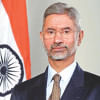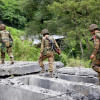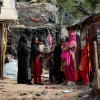'Protect Rohingyas'

Indian authorities beat and threatened Rohingyas, forcing some to flee to Bangladesh in recent weeks, said Fortify Rights yesterday.
"India should urgently protect Rohingya genocide survivors seeking safety and not force them out of the country," said Matthew Smith, chief executive officer of the regional rights body.
"Refugees should never be imprisoned based on their status as refugees. Prime Minister Modi's government should immediately release detained refugees, provide the UN access to them, and protect all survivors of atrocities," he said in a statement.
Indian border security forces reportedly had forced 31 Rohingyas towards Bangladesh last week, and then Bangladesh authorities had blocked the group from entering Bangladesh, trapping them on the India-Bangladesh border in a "no man's land" near Brahmanbaria.
Indian authorities subsequently arrested and put them in custody in Tripura.
More than 1,300 Rohingyas entered Bangladesh from India since May last year, according to Bangladesh Refugee Relief and Repatriation Commissioner Abul Kalam. However, the actual number is believed to be much higher.
According to Indian government, there are an estimated 40,000 Rohingya refugees in India, and about 18,000 of them are registered with the UNHCR. Many of them escaped mass atrocities in Myanmar since 2012.
Earlier this month, Indian authorities reportedly refouled a Rohingya family of five to Myanmar and, in October 2018, forcibly deported seven Rohingya to Rakhine though under customary international law, the principle of non-refoulement prohibits states from returning any person on its territory or under its jurisdiction to a country where they may face persecution.
Article 3 of the UN Convention against Torture and Other Cruel, Inhuman or Degrading Treatment or Punishment, to which India is a party, states: "No state party shall expel, return ('refoule') or extradite a person to another State where there are substantial grounds for believing that he [or she] would be in danger of being subjected to torture."
UN experts have found that conditions are not conducive for Rohingyas to return to Myanmar.
Fortify Rights urged India and Bangladesh to take coordinated action to address root causes in Myanmar and protect refugees seeking safety.
Matthew Smith said, "Safe returns are inextricably linked to legal accountability for perpetrators of mass atrocities in Myanmar. India should join Bangladesh in working with other UN member states to ensure criminal prosecutions for atrocities committed against Rohingya in Myanmar."

 For all latest news, follow The Daily Star's Google News channel.
For all latest news, follow The Daily Star's Google News channel. 








Comments